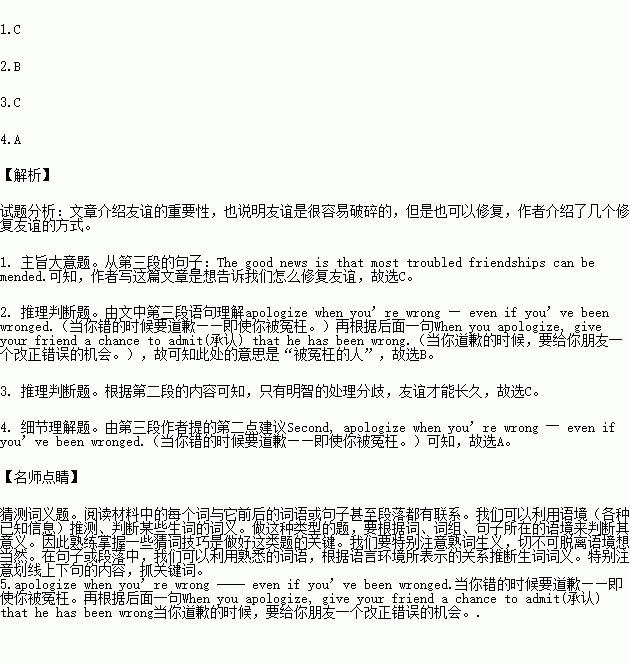题目内容
When asked to point out one or two things that are most important to themselves, many put friends ahead of homes, jobs, clothes and cars.
A true friendship carries a long history of experience that determines who we are and keeps us connected. It is a treasure we should protect. Unfortunately, the better friends you are, the more probably you’ll have disagreements. And the result can be what you don’t want—an end to the relationship.
The good news is that most troubled friendships can be mended. First, don’t let your pride get in your way. Most of us can forgive each other when differences are brought out in the open. Second, apologize when you’re wrong — even if you’ve been wronged. Over the course of a friendship, even the best people make mistakes. Sometimes, it may be best if the wronged person takes the lead and apologizes. When you apologize, give your friend a chance to admit(承认) that he has been wrong. Third, see things from your friend’s point of view. And finally, accept that friendships change as our needs and lifestyle change. Making friends can sometimes seem easy. The hard part is keeping the connections strong during the natural ups and downs that have an effect on all relationships. My suggestion: consider friendship as an honor and a gift, and worth the effort to treasure and nurture(培养).
1.What would be the best title for the passage?
A. Easy Ways to Make Friends
B. Ups and Downs in Friendship
C. How to Mend a Troubled Friendship
D. How to Take the Lead in Making Friends
2.The “wronged person” underlined in the passage refers to a person __________.
A. who has been mistaken for another
B. who has been blamed unfairly
C. who has treated friends badly
D. who has admitted his mistakes
3.According to the passage, a friendship can be long only if __________.
A. we have much in common
B. we know our friends’ mistakes
C. we treat our disagreements wisely
D. we have known one another her desires
4.What should we do if we follow the author’s second suggestion?
A. Make an apology first.
B. Avoid making mistakes.
C. Stick to our own points of view.
D. Change our lifestyles.

